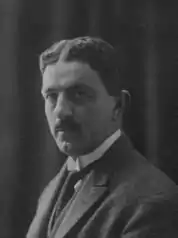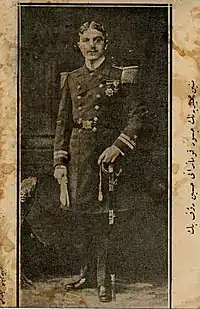Rauf Orbay
Hüseyin Rauf Orbay (27 July 1881 – 16 July 1964) was an Ottoman-born Turkish naval officer, statesman and diplomat of Abkhaz origin.[1][2][3]
Hüseyin Rauf Orbay | |
|---|---|
 | |
| 3rd Prime Minister of the Government of the Grand National Assembly | |
| In office 12 July 1922 – 4 August 1923 | |
| Preceded by | Fevzi Çakmak |
| Succeeded by | Ali Fethi Okyar |
| Personal details | |
| Born | Hüseyin Rauf 27 July 1881 Istanbul, Ottoman Empire |
| Died | 16 July 1964 (aged 82) Istanbul, Turkey |
| Political party | Progressive Republican Party (1923–1924) |
| Alma mater | Turkish Naval Academy |
| Awards | Medal of Independence |
| Signature |  |
| Nickname | Hero of Hamidiye |
| Military service | |
| Allegiance | |
| Branch/service | |
| Years of service | 1895–1918 |
| Rank | Colonel |
| Commands | Ottoman cruiser Hamidiye |
| Battles/wars | Balkan Wars World War I |
Biography

Hüseyin Rauf was born in Constantinople in 1881 to an Abkhazian family.[4] As an officer in the Ottoman Navy, he achieved fame for his actions as the captain of the cruiser Hamidiye during the First Balkan War.[5] He was Chief of Naval Staff during World War I where he led Ottoman forces during the Gallipoli campaign and by October 1918 was Minister of Marine and led the delegation that signed the Armistice of Mudros.[5] Rauf Orbay also played a role in assisting Mustafa Kemal Atatürk in a near court-martial during a feud with Djemal Pasha and Enver Pasha.[6] On 31 October 1918, he signed the Armistice of Mudros as the Minister of Navy, which ended the Ottoman Empire's participation in World War I. When the Turkish War of Independence began, he resigned from his position and went to Ankara to collaborate with Mustafa Kemal Atatürk. He was elected as a member of the representative committee in the Congress of Erzurum on 23 July 1919. He joined the Congress of Sivas as a delegate for Sivas on 4 September 1919 and was elected deputy chairman.
When the War of Independence ended he became the first Prime Minister of the new provisional Government of the Grand National Assembly on 11 August 1922. In 1924, he was one of the founders of the Terakkiperver Cumhuriyet Fırkası (Progressive Republican Party) at the request of Atatürk as part of Atatürk's attempt to begin the tradition of multiparty democracy in the young Republic, in opposition to Atatürk's Republican People's Party. When this party was closed down in 1925 after Atatürk found that Islamist reactionaries had infiltrated its ranks, Rauf went to exile in Europe for 10 years. Later, he was cleared of all accusations and became a member of the Turkish parliament. During World War II, Rauf Orbay was the Turkish ambassador in London,[7] helping keep Turkey out of the war. He always firmly believed in the Republic of Turkey and always stated that Mustafa Kemal Atatürk was the only person who could have organised and led the transformation of the crumbling Ottoman Empire into modern Turkey.
 Rauf Orbay as the captain of the cruiser Hamidiye
Rauf Orbay as the captain of the cruiser Hamidiye Bust of Rauf Orbay in the Istanbul Naval Museum
Bust of Rauf Orbay in the Istanbul Naval Museum
Autobiography
- Cehennem Değirmeni ("Windmill of Hell"), Emre Publishing, September 1993[8]
References
- "Hüseyin Rauf Orbay'ın Hayatı (1880-1964), Atatürk Araştırma Merkezi Dergisi, Sayı:58 Mart 2004". Archived from the original on 28 January 2016. Retrieved 22 January 2016.
- Akyel, Siyami. Türkiye’deki Ünlü Çerkesler
- Ünal, Muhittin (1996). Kurtuluş Savaşında Çerkeslerin Rolü. Cem Yayınları (published 1995). ISBN 9754065829.
- Berzeg, S.E. (1990). Türkiye Kurtuluş Savaşı'nda Çerkes göçmenleri. Nart Yayıncılık. Retrieved 26 February 2015.
- Huseyin Ra'uf Orbey, W.M. Hale, The Encyclopaedia of Islam, Vol. VIII, ed. C.E.Bosworth, E. van Donzel, W.P.Heinrichs and G. Lecomte, (Brill, 1995), 174.
- Mango, Andrew (1999). Ataturk: The Biography of the Founder of Modern Turkey. Woodstock, NY: The Overlook Press. p. 171. ISBN 1-58567-011-1.
- Selim Deringil, Turkish Foreign Policy during the Second World War: An 'Active' Neutrality, (Cambridge University Press, 1989), 206 n48.
- Book summaries (in Turkish)
- Rauf Orbay, Siyasi Hatiralar, Örgün Yayinevi, İstanbul, 2003.
External links
- Works by or about Rauf Orbay at Internet Archive
- Mustafa Alkan, "Hüseyin Rauf Orbay’ın Hayatı (1880-1964)", Atatürk Araştırma Merkezi Dergisi, Sayı 59, Cilt: XX, Temmuz 2004, (in Turkish)
- Kafkas Foundation (in Turkish)